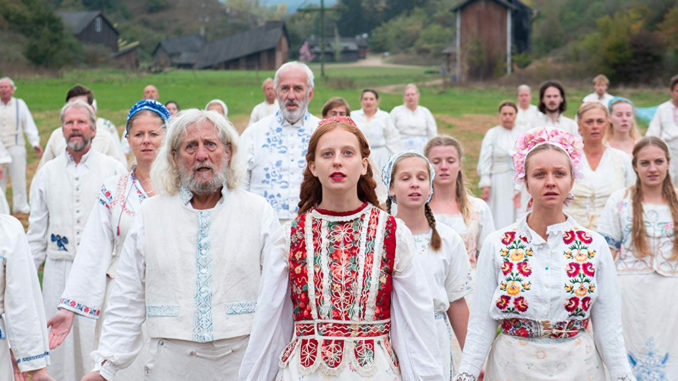
Well, I did it. I begrudgingly held out until almost the last second about it, but I finally choked up the courage to endure my first two-plus-hour horror movie theater experience since Suspiria let me down hard almost a year ago. As I reliably can’t shut the fuck up about, here’s my signature reminder that, yes, there is a right length for a movie and—SPOILER ALERT—it’s NOT over TWO FUCKING HOURS. Linda, honey, listen—that’s a hostage crisis.
If you haven’t already guessed, the movie I saw was Ari Aster’s Midsommar, and despite its objectively outrageous two hours and 20 minutes, my theater experience wasn’t plagued by the frantic watch-checking that I absolutely expected. I checked it a few times—I’m not a monster, after all—but it was more a force of habit than because I was antsy. And that is because Midsommar was one of the most mesmerizing films I’ve seen this year.
Now, I was very skeptical going into Midsommar for more reasons than just its runtime. I have a complicated relationship with Ari Aster’s previous fan-favorite Hereditary, the short of which can be summed up by saying that A24 movies (even and especially the good ones) are generally aggressively overblown. People who don’t usually like horror movies get caught up in the dark, arthouse atmosphere and become tricked, over the two-plus hours of entrapment, into believing that they’re watching one of the best horror films ever made. It’s not right or true, which they’d know if they actually watched horror movies, but it happens and I hate it.
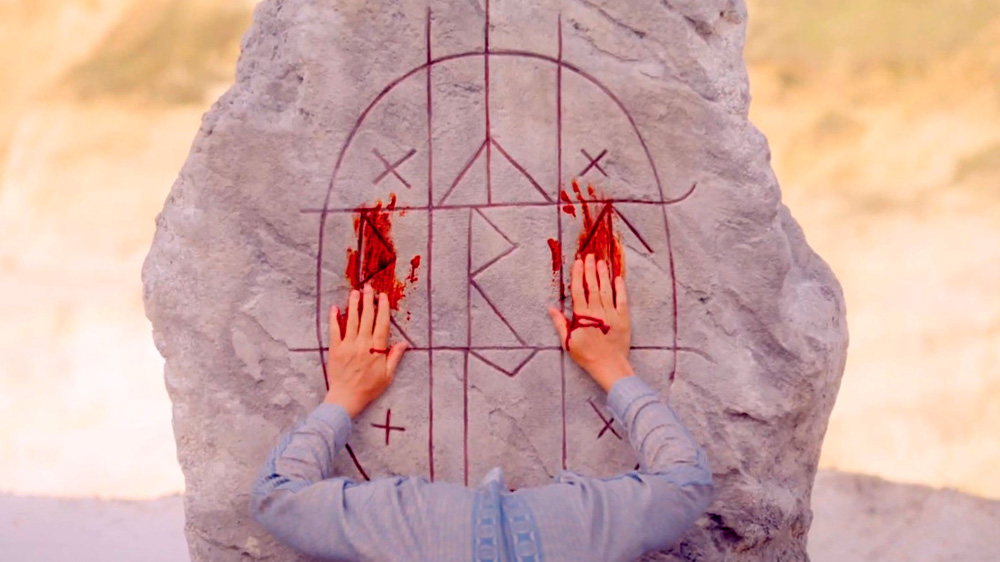
I also have weird feelings about Ari Aster because he keeps passive aggressively shitting all over the horror genre while also making movies that belong in this space. For example, about Hereditary, he said things like, “…I was kind of careful to never really call it a ‘horror film.’ The people that were on the crew, or even the people that I was pitching the film to, I would describe it as a family tragedy that curdles into a nightmare.” Okay.
As for Midsommar, he doesn’t want to call that a horror movie either. “It’s only recently [that Aster began] thinking about Midsommar in the context of his own career, especially because he says he wasn’t really thinking about horror while making it. … ‘For me, [Midsommar] has always been a fairy tale, but I was also aware that this would be pushed as a horror film — it would have to be,’ [Aster] says. ‘Only recently did I become aware of like, oh boy, yeah, this film is going up against certain expectations. Like, Hereditary was this scary; is Midsommar going to be scarier?”
Ari, please, Jesus Christ—just don’t say things like this. Regardless of how you mean it, it’s annoying and disparaging and hurtful to people who don’t look down on the horror genre, instead seeing it for what it is, which is the most engaging, creative, exciting, and flexible genre to work and play in. You’re making horror movies, and they’re good horror movies, but when you say bullshit like the above, it makes it very hard for me to want to give you any kind of credit whatsoever because I don’t like your attitude.

That said, I’m trying to be as objective as I can be here, so I’ll give credit where credit is due. Onward.
While Midsommar was long, it felt long in the way that a Paul Thomas Anderson movie feels long. It’s a special and specific kind of measured storytelling that’s absolutely unconcerned with the audience in every way, but not to its detriment. With Midsommar and so many PTA movies, the story unfolding before you feels like it exists with or without you. It’s not serving you or catering to you in any way, but it’s also not trying to trick or deceive you or throw you off of its scent.
Everything that you think is going to happen over the course of the movie eventually does happen, and when it does, you’re not rewarded for sussing it out or guessing correctly, nor are you disappointed for a lack of a challenge. This absence of mystery is one of the things that made the film so mesmerizing to me; it’s not often that a horror story presents so plainly and still manages to be so effective. An example that comes to mind is John McNaughton’s Henry: Portrait of a Serial Killer (1986)—measured, explicit, unmysterious, symptomatically punishing, and absolutely horrifying.

Midsommar’s framing narrative isn’t massively original—we have a vulnerable protagonist, we have Swedish cult stuff, and you can guess the resulting gist—but the execution is so good. Aster catches his audience right away with the cold open—scenic shots reminiscent of the open to David Fincher’s Gone Girl (2014) that are cut short as we’re thrown into our protagonist’s concurrently unfolding family and relationship drama. And once Aster has you, he doesn’t lose you for a second. We feel awkward when he wants us to, devastated when he wants us to, scared and curious the same. These feelings aren’t necessarily welcome or unwelcome; it’s just that your emotional participation in this film is simply never a choice.
The success with which Aster draws his audience in and holds them tightly for longer than he should’ve I’m used to accepting is heavily supported by the film’s excellent cinematography, done by Hereditary’s Pawel Pogorzelski. Largely taking place outside, set in the breathtaking mountains of Sweden (but filmed outside of Budapest, Hungary), every shot is as beautiful as the subject it’s framing. This even applies to the less important shots.
For example, there’s a sequence early on in which our protagonists are driving down a woodsy, winding road on their way to the culty Swedish community. Following the car, a drone shot pulls us back and up overhead, before slowly rotating entirely upside down and continuing to hold like that, still tracking the car, for much longer than you’re anticipating. It’s a quiet, long showcase of a sequence that, while transitional to the story, is truly one of its most breathtaking moments. And it’s not the only one.
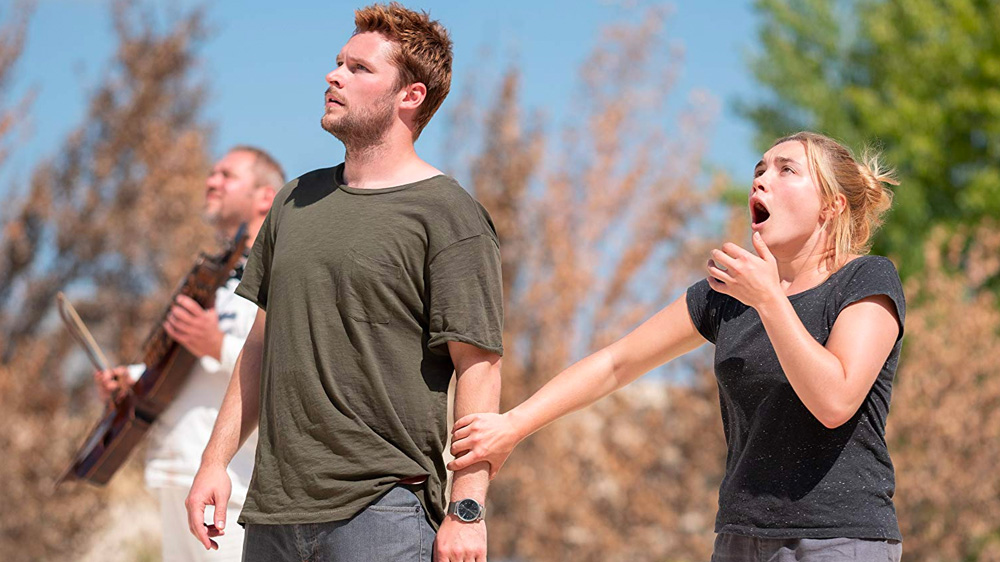
Midsommar is packed with moments like these, shots that I absolutely loved having a few seconds to sit within, and many of them were horror sequences. There’s a lot of excellent and fucked up body-based horror imagery that oscillates between, “Yep, that’s probably how that looks in real life,” and, “If I ever see anything that fucked up in real life, I shan’t survive it.” In either case, that’s a major win.
While I don’t want to give anything else about Midsommar away, I will reiterate that you shouldn’t go in expecting a mystery. Instead, expect a film that tells you exactly what it’s going to do throughout and still manages to lock you in a pleasantly surprising and mesmerizingly unbreakable stranglehold despite.

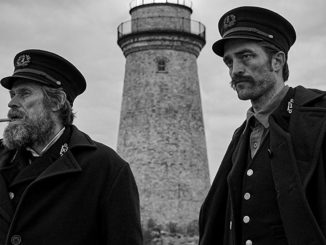
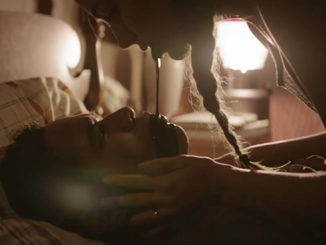

Be the first to comment